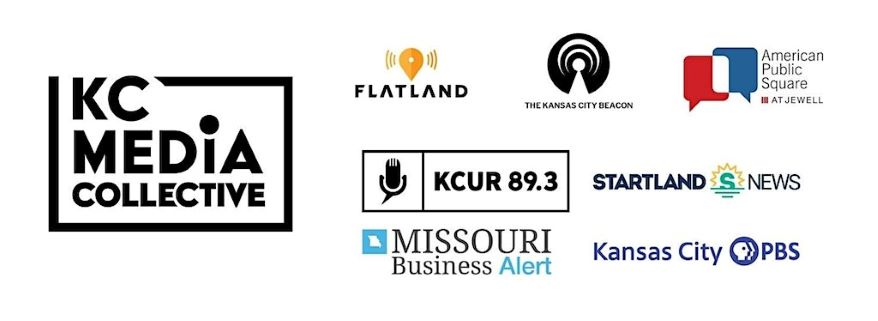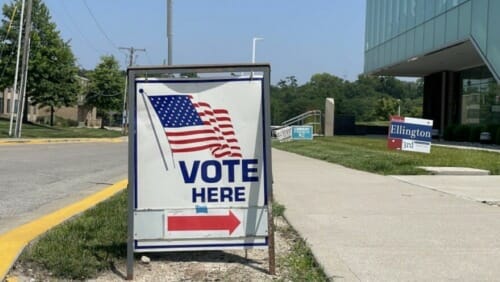Endorsements Shift Kansas City’s Political Landscape Even as the old guard of Kansas City politics made endorsements, newer groups like KC Tenants Power and Northland Strong shaped the 2023 City Council election.
Published June 22nd, 2023 at 6:00 AM
Above image credit: KC Tenants Power staged a rally last Saturday before the Kansas City general election and then knocked on 3,000 doors to get out the vote for candidates that received the group's endorsement. (Zach Bauman | The Beacon)When it comes to political endorsements, the contrast between the Citizens Association of Kansas City and newer voices like KC Tenants Power is stark.
One has almost 90 years of history behind it.
The other, not even a year.
But both were successful players this election cycle with each organization endorsing at least one winner in their race for the Kansas City Council.
The message: Endorsements still matter.
They matter to candidates who seek them from sources like unions, former elected officials and political organizations. They also matter to voters who look to them for guidance.
Endorsements also can fuel crucial campaign contributions, especially for a candidate who is not well-known.
It’s difficult to prove which endorsements end up being most effective at recruiting voters — every political organization would naturally like to take credit for their candidates’ successes.
To weigh their impact, The Beacon and Flatland analyzed precinct-level results from the April 4 primary to gain insight into the influence of political endorsements. Detailed results for Tuesday’s general election will not be available for a couple of weeks, when election officials certify the ballot counts.
Overall, the analysis showed that Freedom Inc. and KC Tenants Power endorsements were most effective in Jackson County, and the Fraternal Order of Police and Northland Strong endorsements were most effective in Clay and Platte counties.
The study also looked at how different groups arrive at their endorsements and what type of support — from financial contributions to turning out votes or merely a supportive post on social media — comes with the recognition.
Endorsements have long had a place in Kansas City politics. Still, the political landscape may be changing.
The Citizens Association’s membership is aging, with many tracing their political involvement to previous eras. Its members recall when Kansas City saw the election of the first woman as mayor, the first (then second, then third) African American mayor, the redevelopment of downtown and the beginnings of the KC Streetcar line.
KC Tenants Power, meanwhile, is more focused on the struggles to earn a living wage and secure affordable housing in a city where 46% of residents are renters.
And they’re very visible.
The KC Tenants group rallied last Saturday before the election and then knocked on 3,000 doors to get out the vote for their slate. Like other long-standing groups, they were strategically placed at polling sites around the city Tuesday, handing voters flyers to remind of the group’s slate.
The Citizens Association, meanwhile, roused itself from a dormant state to participate in the election. The group, which calls itself “Kansas City’s oldest nonpartisan political organization,” has been involved with local politics since 1934.
Earlier this spring, the organization tapped Donovan Mouton, who had been the last person serving as president before the organization went dormant around 2016.
The group co-hosted a series of candidate forums, solicited questionnaires and then grilled candidates in screenings ahead of the primary.
When it was time for the directors and then the board of governors to vote on endorsements, longtime civic and political insider Mike Burke called in from hospice care, offering his well wishes.
Burke, a former city councilman, a one-time candidate for mayor and longtime steward of the city’s economic development, died soon after at the age of 73.
“We need younger blood,” said Mouton, who was a top staffer for Mayor Kay Barnes, who served from 1999 to 2007.
Mouton noted that this election cycle, neighborhoods, or the coalitions they once formed, appeared to be less impactful.
“City elections have a history of being neighborhood/community-based for political support and priorities,” he said.
Importance of coalitions
Kansas City has long been marked by political factions that form coalitions and build power behind the scenes.
Since the 1930s, when the Citizens Association formed in opposition to the corrupt Pendergast political machine, political groups have formed and disbanded regularly. An enduring exception is Freedom Inc., founded by Bruce Watkins and Leon Jordan in 1962. It has mobilized Black voters in municipal politics for more than six decades, including the just-completed city races.
But as the old guard of Kansas City politics continues to make endorsements and campaign contributions, newer political groups like KC Tenants Power and Northland Strong have flexed their muscles in the 2023 City Council elections, rallying voters among broad coalitions within the interconnected web of local political actors.
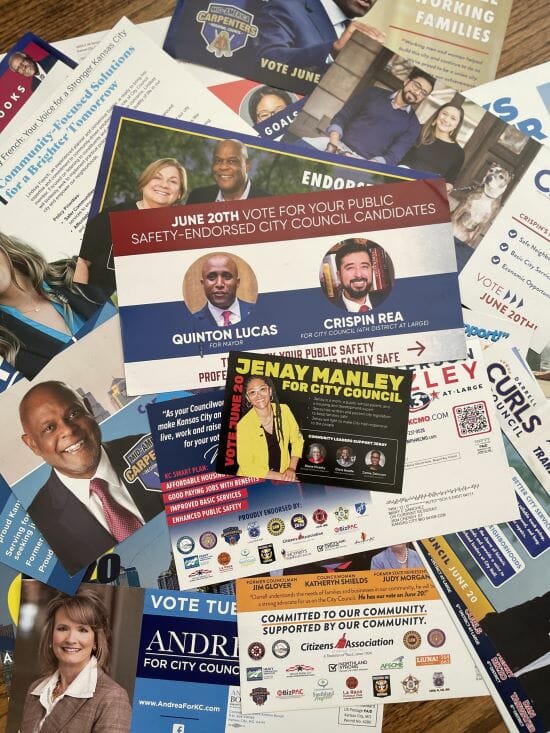
Northland Strong, which formed a few years ago in response to a perceived lack of representation on the Kansas City Council for neighborhoods north of the Missouri River, has focused on three key issues in this election. The group wants to increase the power of the Kansas City Police Department, make Kansas City more friendly to developers and underscore continuing frustration with how redistricting upended traditional boundaries for the 1st and 2nd Districts.
In 2021, the City Council redrew the boundary between these two districts mainly along Barry Road, a change from its former boundary that separated Clay and Platte counties.
Northland Strong has been working closely with the Fraternal Order of Police (FOP), endorsing the same candidates for nearly every City Council race. This coalition also includes Freedom Inc. in some of the races — particularly in the 2nd and 3rd Districts at-large, where a deal of sorts was struck.
”We talked to Freedom Inc. about supporting Lindsay French for the 2nd District at-large,” said former City Councilmember Ed Ford, who serves on the Northland Strong executive committee. “Lindsay has been very active in the Northland over the years, and she’s running against Jenay Manley, who’s one of the tenants’ rights folks. We found out Freedom Inc. didn’t care for Jenay either, so that was an easy call. They asked us if we would double our efforts for Melissa Patterson Hazley, which we were happy to do.”
In the districts where Freedom Inc., the FOP and Northland Strong all made endorsements, all three endorsed the same candidate. The only exception was the 4th District at-large, where Freedom Inc. endorsed Crispin Rea while the FOP and Northland Strong endorsed Justin Short.
‘Mess with the bull, you get the horns’
The familiar messaging on the yellow T-shirts of KC Tenants, and a black bull, were present at a get-out-the-vote rally ahead of Tuesday’s election in a Midtown parking lot.
The energy was palpable.
Speakers enthused about the Kansas City they’re working to build — neighborhoods with affordable housing, where neighbors look out for one another and public transportation is reliable.
The bull, wearing a sash that said “We are stronger together,” was two people in a costume.
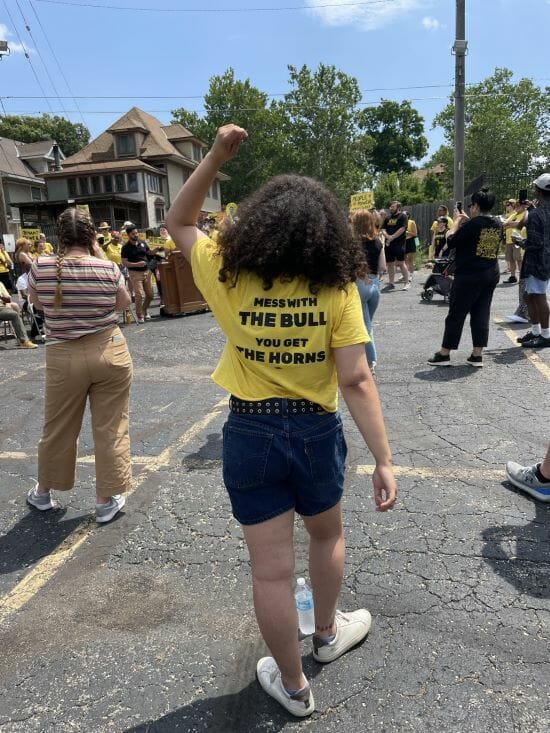
Seated on folding chairs, the three nonincumbent candidates backed by the KC Tenants waited their turn at the microphone — Johnathan Duncan, Michael Kelley and Jenay Manley.
Each was greeted by a chorus of chants, among them, “We believe that we will win.”
KC Tenants Power, the political arm of the citywide tenants union KC Tenants, has been working in a coalition of groups including Abortion Action Missouri (formerly known as NARAL Pro-Choice Missouri), the KC Sunrise Movement and the Service Employees International Union.
All four groups rallied behind three candidates in particular: Manley in the 2nd District at-large, Michael Kelley in the 5th District at-large and Johnathan Duncan in the 6th District. In all three races, Freedom Inc., the FOP and Northland Strong endorsed the opposing candidate.
As a general principle, Northland Strong shies away from endorsing candidates backed by KC Tenants Power. The only candidate endorsed by both groups is Melissa Robinson, an incumbent running in the 3rd District.
“They’re about the exact opposite from us,” Ford said.
Unifying KC Tenants Power and its allied groups is an organizing principle featured on the KC Tenants website: “The people closest to the problem are closest to the solution.”
Manley is a renter herself and organized with KC Tenants. Duncan, a former renter, also organized with KC Tenants before running for City Council.
“What may set one candidate apart from another is how someone brings their lived experience of dealing with barriers to reproductive health care into the work that they’re hoping to do, and how someone builds the coalition around themselves,” said Mallory Schwarz, the executive director of Abortion Action Missouri. “For our close partners at KC Tenants, they have brought candidates out of their organizing movement and are bringing them into leadership.”
Questions political groups ask candidates
When candidates sit down for an interview or fill out a questionnaire, all of the political groups start out by establishing their platforms.
Northland Strong outlines their three guiding principles: “I would say we stand for three things: We’re pro-Northland, we’re pro-police, and we’re pro-development,” Ford said.
With the candidates, Ford said they talked about the 2021 City Council ordinance that transferred $44 million from the police budget to a community policing fund. The ordinance was blocked by the Missouri Supreme Court.
The group also takes issue with the City Council’s regulation of economic development, which Ford says has caused development to move outside of city boundaries in the Northland.
After a conversation with the candidates, Northland Strong consulted with local community leaders including outgoing City Council members Teresa Loar and Heather Hall, both ineligible for reelection, as well as members of Kansas City economic development groups.
La Raza, a group that represents Latino voters — particularly in Kansas City’s Westside and Historic Northeast — reaches out to all of the candidates, but not every candidate responded in time for an endorsement.
This was a factor in La Raza’s endorsement of Henry Rizzo over Eric Bunch in the 4th District.
“We don’t have any voice in City Hall. When you call people, they don’t return your calls,” La Raza President Rabbit Hernandez said. “The main (question) is: ‘Do you have an open-door policy? Will you come to town halls at least once a month to hear our needs?’”
The winning candidacy of Crispin Rea, who was enthusiastically endorsed by La Raza for the 4th District at-large seat, marked only the third time in city history that a Latino was elected to serve on the City Council. Rea will fill a nearly 30-year void in Latino representation.
Besides endorsements, the Citizens Association takes a stand on public issues. It is a supporter of the city manager/mayor form of government, placing an emphasis on “good government,” Mouton said.
As an abortion-rights group, Abortion Action Missouri asks candidates if they support access to abortions. But in a field of progressive-leaning candidates, identifying as supporting abortion rights is not enough.
“It’s not enough to just be pro-choice,” Schwarz said. “We look at the scope of issues that impact someone’s ability not just to get an abortion, but to choose to have children and to be able to raise their children in safe environments.”
These factors include a person’s ability to make a living wage or their access to housing, child care and health insurance.
Inside endorsement decisions
For most political organizations, the ultimate endorsement decision comes from the board. This is the case for Abortion Action Missouri, La Raza, the Citizens Association and Northland Strong.
This year, the decisions were typically unanimous. Northland Strong’s primary endorsement for the 5th District at-large was one exception — some members wanted to support Darrell Curls over Theresa Cass Galvin. When Galvin did not make it past the primary election on April 4, the group endorsed Curls.
But in contrast to the other groups, KC Tenants Power made an effort to involve their base in every level of decision-making.
“To whom are you accountable?”
“What is the definition of a good job?”
“What is the root cause of crime?”
Each of these questions was asked by KC Tenants Power in their questionnaire, along with a litany of other queries that drilled into the candidates’ commitment to empowering poor and working-class people.
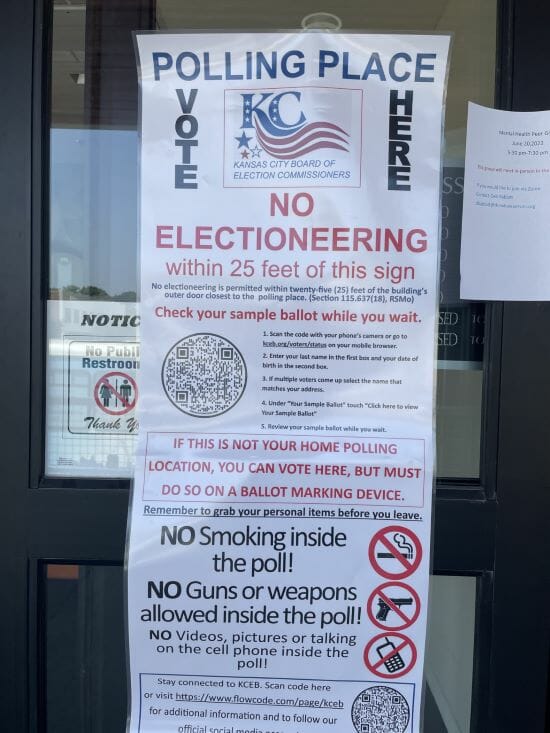
KC Tenants Power was very intentional and democratic in the effort, which began last fall as they devised their endorsement process.
“In everything that we do, we’re trying to bring in the most voices possible,” said Wilson Vance, KC Tenants Power political director. “And in everything we do, we’re also trying to develop our members as leaders in their community.”
They devised a “people’s platform” through a public survey, listening sessions and meetings with labor unions, high school students, advocacy groups and leaders of nonprofits.
Next, more than 200 people attended a meeting to ratify it.
The platform informed their candidate questionnaire, scored using a 1-10 scale for each section. Those who averaged 8 or higher became eligible to be considered for an endorsement.
The sections asked about a candidate’s class background, their top priorities, if they’ve ever profited from owning or managing rental space or accepted campaign contributions from anyone who has done so.
They were also asked about holding landlords accountable for conditions of properties and how as an elected official they might expand tenant rights.
The group also held their own candidate forum, in addition to attending many of the events led by other endorsing groups.
It took two evenings and seven hours, but a core team of 27 people recommended a slate of candidates.
Those names were then put before the larger base group at a meeting attended by 200 people, with a goal of gaining two-thirds support. The base voted to accept the recommended slate.
“We’re really trying to reimagine the way politics works in Kansas City,” Vance said.
Value of endorsements
Northland Strong’s support is primarily financial — Ford estimated that they’d spent more than $100,000 on this year’s city elections. The FOP also spends thousands of dollars on campaign donations.
All of the organizations interviewed also sent campaign mailers across the city. La Raza focused primarily on the Westside and Historic Northeast, and Northland Strong focused on the 1st and 2nd Districts.
Freedom Inc., La Raza, KC Tenants Power and Abortion Action Missouri also provide support with poll workers and door-knocking events, such as the one on June 17.
The Citizens Association only endorsed during the primary. But members used their social media and other contacts to promote the slate through the general election.
But some organizations are also strategizing for the future.
For one, the coalition of political organizations and candidates established during the election could set the stage for partnerships between members of the City Council. Some of the organizations set up the endorsement process specifically so that they could advocate for policy in line with their platforms.
For example, before candidates were allowed access to the Abortion Access Missouri candidate questionnaire, the organization required them to read a presentation about the state of abortion in Kansas City.
To be eligible for an endorsement, candidates were required to commit to using inclusive language and to recognize the disproportionate impact that abortion bans have on marginalized communities.
Their aim is that every candidate who responded to their questionnaire, whether they received an endorsement or not, would have a baseline level of knowledge about their cause.
“We know that candidates, whether they win or lose an election, and especially those that may lose … are likely to have other opportunities in their political careers,” Schwarz said. “Our goal is to maintain and build those relationships because in the end, we all want the same thing, which is liberated access to abortion and reproductive health care.”
How it played out
On June 20, when voters went to the polls to mark their selections for the new City Council, they were greeted by political organizations handing out flyers with their slates of endorsements.
When results rolled in, they showed a mix of wins for the various endorsement groups.
French, Patterson Hazley and Darrell Curls won their respective races; all were endorsed by Northland Strong, Freedom Inc. and the FOP.
Rea, who received endorsements from La Raza, Freedom Inc. and Abortion Action Missouri, also won.
Among the candidates backed by the KC Tenants Power coalition, all of the incumbents won, in addition to Duncan, who prevailed in a tight race against Dan Tarwater. Tarwater was backed by Freedom Inc., Northland Strong and the FOP. Manley and Kelley were the only candidates endorsed by KC Tenants Power who did not win.
Some question whether endorsements will continue to be meaningful for younger generations.
“I think a lot of organizations haven’t really found the magic of getting in touch with and staying engaged with younger voters,” said Joni Wickham. “So there’s a disconnect there.”
Wickham co-founded a strategic communications firm with former Mayor Sly James. Previously, she was James’ chief of staff. Their firm helped with the successful campaigns of French and incumbent Kevin O’Neill (1st District at-large).
But for a candidate who is not well-known, someone who is new to politics or even civic involvement, an endorsement can serve as an important introduction to voters. It can signal a sense of comfort with a candidate, if the voter trusts the group making the endorsement.
“Endorsements can mean different things, for different candidates, at different moments in different races,” Wickham said.
Josh Merchant is a local government reporter with The Kansas City Beacon, a member of the KC Media Collective. Mary Sanchez is senior reporter for Kansas City PBS/Flatland.
